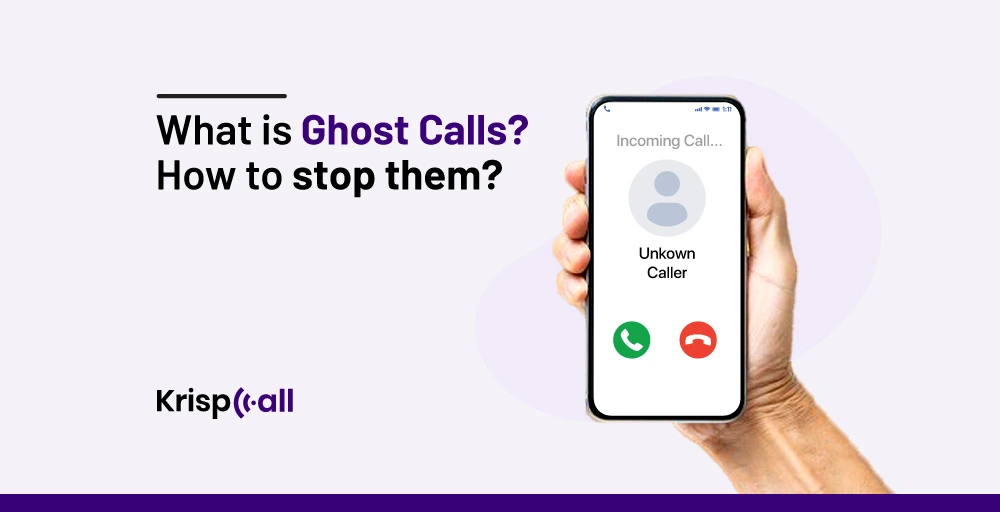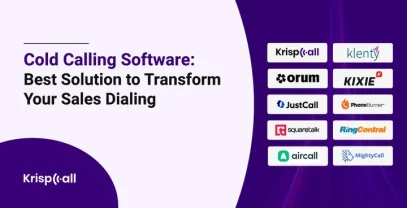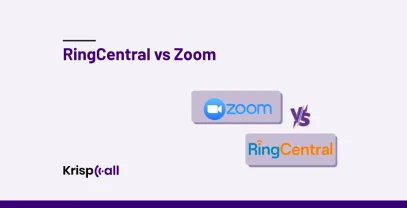Have you ever received a phone call and, after answering, you only found silence? Sounds frustrating and time-consuming ⏰ right?
But don’t worry; we’ve got your back! These are work attempted by 👻 Ghost calls, which basically attempt to lure you into returning a call, leading to potential scams.
In this article 📑, we’ll explore the strategies used by scammers and, most importantly, effective strategies to prevent them altogether.
In order to guide you through the process of understanding the risks, we will provide you with a technological tool that will allow you to regain control over your device so that you can change your response to these interruptions.
🔑 Key Points
- Ghost calls can be identified through short-duration calls, automated responses, unusual call patterns, etc.
- Ghost calls, also known as phantom calls or SIPVicious calls, can originate from various sources, such as Caller ID Spoofing, Misconfigured Systems, cybercriminals, and so on. ⚠️
- Reasons for ghost calls are to commit fraud or scam, accidental dials, autodialer timeouts, and so on.
- To identify ghost calls, analyze your call logs and voicemail messages, also update the phone software.
- KrispCall offers comprehensive features and functionalities to eliminate ghost calls effectively.
What are Ghost Calls?
Ghost call, also an abbreviation of phantom call, refers to a phone call that appears on users’ caller IDs without actually connecting with anyone. There will be no display of any identifiable information in call logs.
These calls often leave people confused since they receive notifications of missed calls, yet upon returning the call, they find that the number is disconnected.
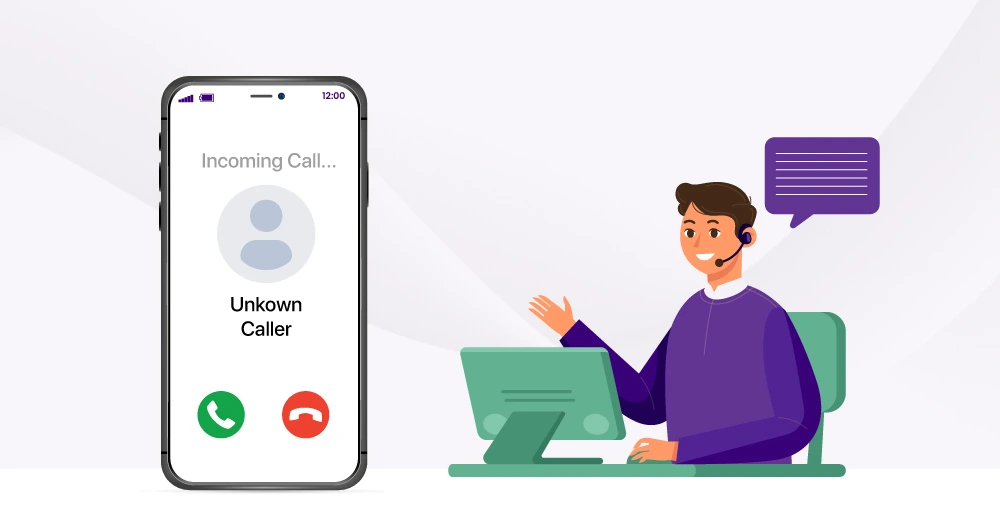
These phantom calls are typically the result of automated dialing systems used by telemarketers, scammers, or robocallers. These systems can generate and dial numbers randomly or sequentially, including both valid and invalid numbers.
For example, When a call goes through to a valid number, it registers on the recipient’s caller id, but if there are no operators available to take the call. So, the call may terminate before any communication occurs. This leaves the recipient with a missed call notification.
This scam, also known as a “one-ring cell phone scam,” has been around for years, gaining and losing popularity over the years. In this case, foreign scammers use auto-dialers to call primarily cell phones in the U.S. with a single ring. This is done in the hopes that the recipient of the “missed call” will be curious and call back right away.
Upon receiving the call, the recipient’s phone bill will show a charge for this international toll number. In return, scammers are then paid a percentage of the call cost. But as scammer activity escalates, the Federal Communications Commission (FCC) has issued updated warnings about this scam since 2014.
How do Ghost Calls occur?
Due to the rise of automated processes, technical issues, or malicious intent aimed at exploiting or verifying phone numbers. They can be annoying and frustrating for recipients, leading to concerns about privacy and security.
Also, here are several reasons why ghost calls occur, such as:
1. Auto-Dialing Systems
With the help of an auto-dialing system, telemarketers, scammers, and robocallers often use automated dialing systems to make calls in bulk. These systems can dial multiple numbers simultaneously without requiring a person’s help. But it might not always have an efficient mechanism in place to handle unanswered calls.
2. Caller ID Spoofing
Here, the scammers try to manipulate the information by using their techniques so that the recipients are likely to answer the outbound calls. Through it, they hide their true identities and locations so that it can be hard to trace them down to law enforcement. Through this, they can conduct scam calls and other fraudulent activities by using other devices.
For example, scammers may spoof the caller ID of a recipient’s bank and claim that there is an urgent issue with their account. Then, try to get the recipient to disclose personal or financial information or follow instructions to transfer funds.
3. Incomplete or Failed Connections
Due to network issues, you might face some network issues like dropped calls, signaling errors, and congestion during the calls. In such cases, the call may register on the recipient’s caller ID despite no actual communication occurring.
However, in rare scenarios, weather conditions can also interfere with cellular signals, which can lead to dropped calls and ghost calls.
4. Validation of Active Numbers
To scam people, they use ghost calls so that they can validate if the phone numbers are still active. But sometimes businesses might use aggressive calling tactics to reach multiple times within a short period.
This means that even though your number is active, the service might not have updated its internal data in real time, which can lead to repeated ghost calls even after you unsubscribe.
5. Automated Systems or Robocalls
Due to various reasons such as insufficient staffing, technical limitations, or programmed termination, automated systems or robocalls may initiate calls without being able to reach a person.
Also, Robocalls programs their system in a way that they can abandon calls after a certain number of rings. It also makes up a large number of all phone calls, especially spam calls. As a result of this immense volume, the ability to receive ghost calls made by automated systems increases.
How do you identify Ghost Calls?
In most cases, telephones and mobile phones are discovered using automated software that performs a “Port scan.”
So identifying a ghost call, where they leave no real voice messages or interactions, can be a little bit tricky.
But don’t worry! 😟
An easy way to identify the source of ghost calls is by finding the call log. Pay attention to an unusual caller ID, where scammers often use fake or invalid numbers with repetitive sequences like 1000 or prefixes that don’t exist, like 100 and so on. So, it can be a strong sign of a phone call coming from somewhere that does not exist.
Also, you can check for cross-references of missed calls with online databases. Websites like “WhoCallsMe” can help you identify suspicious numbers and see if others have reported them as spam.
Sometimes, you might face a sudden call drop by briefly connecting. This can also be one of the signs where tactics are used by the scammer.
How to stop Ghost Calls from Landline?
Stopping ghost calls on landline phones can be challenging, as these calls often exploit vulnerabilities in the traditional Public Switched Telephone Network (PSTN). However, there are some measures you can take to reduce the frequency of ghost calls:
1. Caller ID Authentication
Set up your telephone service provider’s caller ID authentication features, such as call authentication protocols like STIR/SHAKEN (Secure Telephone Identity Revisited/Signature-based Handling of Asserted Information Using toKENs), which helps to fight against illegal which enhances your security and privacy.
These features can help you verify the authenticity of incoming calls. Additionally, it will mitigate spoofed caller ID numbers commonly used in ghost calls.
2. Call Blocking
Many landline phones come with call-blocking features that allow you to block specific numbers or types of calls. Such as international calls.
Blocking ghost calls can help you to focus on the main important things. So, update the blocker’s blacklist regularly with known spam numbers. You can also report ghost calls to your landline provider and seek guidance from the FCC to track down culprits.
3. Do Not Disturb Mode
Put your landline phone in “Do Not Disturb” mode during times when you don’t expect important calls. But this won’t stop ghost calls directly, but it help minimize disruptions caused by unwanted calls.
So explore the call-blocking features build into your landline service. They might allow blocking specific numbers, private numbers, or international calls, potentially reducing ghost calls.
Lastly, you can contact your service provider to inquire about an advanced call-blocking option or setting your landline provider might offer to address ghost calls specifically.
4. Register with Do Not Call Lists
You can register your landline phone number(s) with national or regional “Do Not Call” lists, such as the National Do Not Call Registry in the United States. Through this, you can immensely reduce the telemarketing calls and easily make a filed complaint with a relevant regulatory agency.
Also, update your registration regularly so that you can reduce the number of unwanted telemarketing and robocalls you receive.
5. Use Third-Party Call Blocking Devices or Services
To stop ghost calling from landline phones, consider using third-party call-blocking devices or services that can help you identify legitimate calls and stop receiving unwanted contact.
Using these services may offer you many advanced features like call screening, call blocking, or caller ID verification techniques to filter out suspicious calls before they reach your phone.
To use third-party call blocking, you can consider these points:
- Sign up and register your landlines
- Configure call-blocking system
- Activate call-blocking features
- Monitor and adjust settings as needed
- Stay informed about updates
How to stop ghost calls from VoIP or the business cloud?
To stop ghost calls from VOIP or the business cloud, follow the below points:
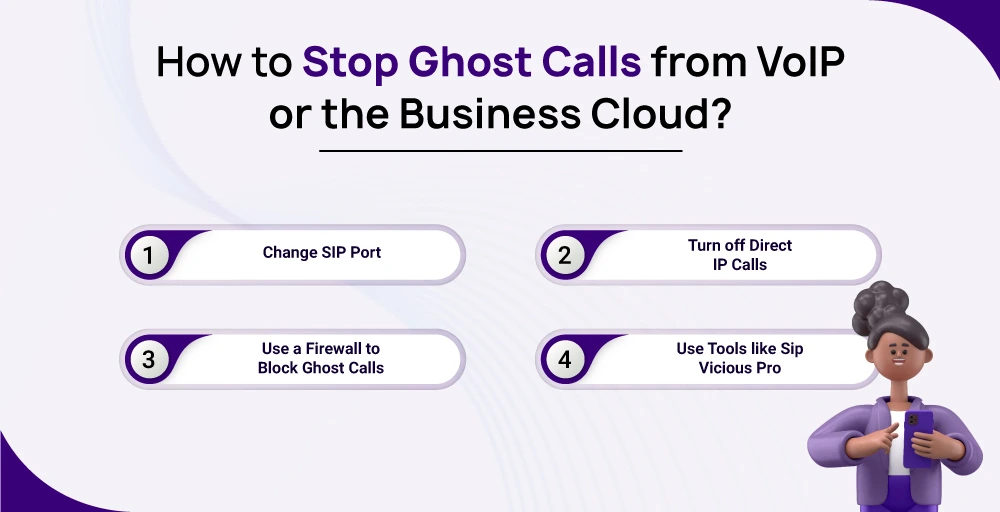
1. Change SIP Port
SIP (Session Initiation Protocol) is a standard protocol used for initiating, maintaining, and terminating real-time sessions such as VoIP calls. Ghost calls often target SIP ports, particularly the default port 5060.
By changing the SIP port to a non-standard one, you make it more difficult for automated scanners and attackers to discover and exploit your system.
Hence, changing the port adds an extra layer of security, but it’s not 100% secure. Attackers can still perform port scanning to discover the new port. So it should be part of a complete security plan rather than the only safeguard.
2. Turn off Direct IP Calls
Direct IP calling allows callers to connect to your VoIP system using your IP address directly, bypassing some security measures such as SIP authentication.
So, you should disable direct IP calls by changing your settings through it you can reduce the risk of ghost calls by improving security.
3. Use a Firewall to block ghost calls
A firewall is a network security device or software that monitors and controls incoming and outgoing network traffic based on predetermined security rules. So, configure your firewall to block incoming requests from suspicious or known malicious IP addresses associated with ghost calls.
Additionally, set up rules to only allow SIP traffic from trusted sources, such as your VoIP provider’s IP addresses or known business partners.
You can disable the “Direct IP calls” setting. And because of its ability to filter port scans from legitimate sources of traffic, using a firewall is a reliable way of blocking ghost calls. Plus, port scan alerts and firewalls can be used to monitor traffic to your ports and ensure malicious attackers do not detect potential opportunities for unauthorized entry into your network.
4. Use Tools like Sip Vicious Pro
Consider using specialized SIP security tools or SIP system services designed to detect and prevent ghost calls, such as Sip Vicious Pro or other similar solutions. It is a reliable command tool that helps to minimize potential vulnerabilities.
First, let’s discuss port scanning, the most serious threat. The SIP Vicious port scanner was introduced in 2007 and quickly became popular. The name of SIP Vicious sounds scary, but the service it provides is legitimate.
For example, to verify or check their network security policies, network administrators and quality assurance teams use it. Unfortunately, SIP Vicious has been adopted by hackers for the purpose of finding potential vulnerabilities in systems.
Apart from making international calls that can cost you tons of money, these cybercriminals can also disrupt legitimate calls that are being made or received on your computer. Thus making it difficult for you to conduct business. Worst of all, they can access passwords and even attack other network devices too.
How to stop Ghost Calls from mobile?
There are several ways to prevent dialing on your cell phones by considering using a reputable call-blocking app that can be available in your app stores. Due to its features like call screening, it will automatically block suspected spam and have the ability to report unwanted numbers.
Additionally, you should make sure that your mobile operating system and call management apps are up to date. Newer versions often include enhanced security features and better call-blocking options that prevent ghost calls.
Finally, be cautious when sharing your mobile number online or with unknown parties, as this can increase the likelihood of receiving unwanted contact.
Use VoIP Phone System like KrispCall to Eliminate Ghost Calls
Employ the KrispCall VoIP phone system to eliminate Ghost calls for your business or personal use. It offers advanced call management systems and solutions to deal with these unpleasant behaviors, such as monitoring and mitigating, port scanning, and other concerns, as well as detecting scams with a fraud team.
Through utilizing a KrispCall, you can use many advanced features like call blocking, contact blocking, call filtering, and others to filter out nuisance calls. It can enhance your productivity by reducing interruptions and distractions.
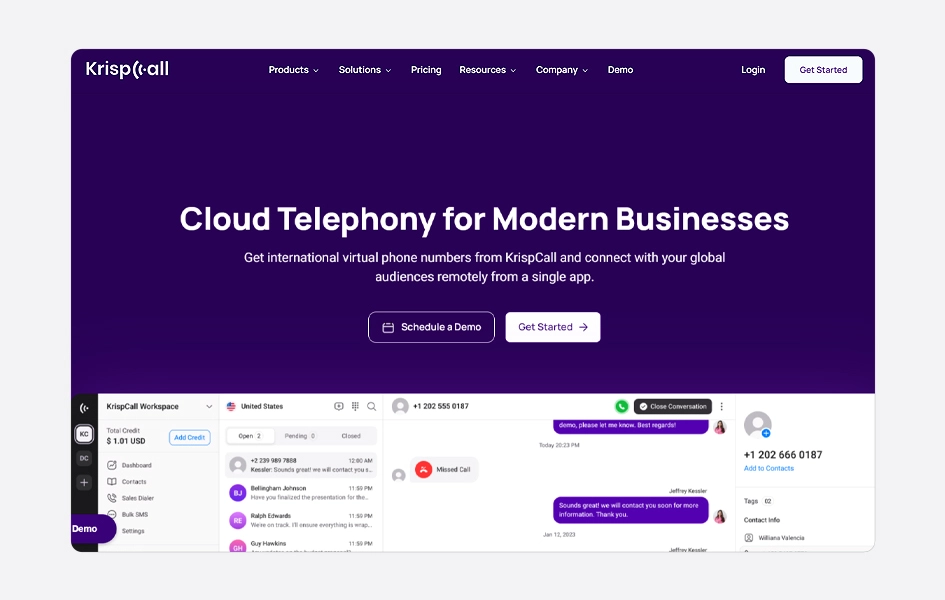
Furthermore, KrispCall helps businesses save costs by reducing unnecessary charges associated with ghost calls and mitigates security risks such as toll fraud and eavesdropping.
Additionally, customers can choose what action they want to take — simply ignore calls from legitimate sources or send suspicious calls to voicemail if they are careful enough to check.
And since KrispCall is a hosted solution, clients do not have to purchase any additional products where everything is built right into the software. So, if you would like more information about how KrispCall protects your data and the data of your customers, please contact a KrispCall sales team.
Final Words
Ghost calls are not merely harmless annoyances but represent a significant threat to privacy, security, and peace of mind. By understanding their nature and employing proactive measures, you can effectively prevent them.
So, don’t hesitate to report suspicious activity, whether it’s a ghost call or a suspected scam attempt. Also, notifying your phone carrier and relevant authorities can help prevent fraudulent activities and protect others from becoming a victim.
With these proactive measures in place, you can eliminate this problem from your life. Additionally, it ensure you have a more secure communication experience.
FAQs
1. Where does Ghost Call originate from?
Ghost calls can originate from many sources, such as scammers, robocallers, telemarketers, and technical glitches.
2. What are the consequences of Ghost Calls?
The consequences of ghost calls may include
- Annoyance and disruptions
- Raise privacy concerns
- Potential scams or fraud
3. What should you do when you receive a ghost call?
If you receive a ghost call, then you should:
- Try to avoid answering calls
- Do not return a call
- Block the number

